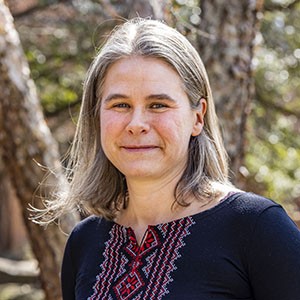Education
Ph.D., Cornell University, 2009
Areas of Expertise
- Evolutionary ecology/Biogeography
Research Interests
- Population Ecology
- Community Ecology
- Organismal Ecology
- Terrestrial Ecology
- Conservation Ecology
- Global Ecology
- Evolutionary Ecology
Anthropogenic climate change has already influenced the ecological dynamics of species, through altitudinal and latitudinal shifts in geographic ranges, altered phenology, and disrupted species interactions. Owing to the rapid pace of climate change, species might not have the dispersal abilities needed to track preferred climates, nor the traits necessary to survive in novel conditions. Climate change will likely impose considerable selection for stress tolerance. Nevertheless, the evolutionary consequences of contemporary climate change remain essentially unresolved.
We are investigating constraints on adaptation in the context of global change using a species of mustard (Boechera stricta) native to the U.S. Rocky Mountains. We conduct large-scale field and growth chamber/greenhouse experiments to examine how climate influences patterns of trait expression, natural selection, and local adaptation. We test whether phenotypic plasticity could enable population persistence in the short term and whether fluctuating conditions associated with climate change actually favor plasticity. Our studies also evaluate whether local populations maintain sufficient genetic variation to respond to novel selection. Finally, we are using ecogenomic techniques to examine patterns of gene expression under varying climatic regimes, and ultimately to dissect the genetic basis of local adaptation to climate.
Our lab also investigates seed dispersal by frugivorous fish in tropical South America. Seed dispersal is a critical stage in the life history of plants. It determines the initial pattern of juvenile distribution, and influences community dynamics, species diversity and gene flow among populations. One major group of vertebrates has been largely overlooked in studies of seed dispersal: fruit-eating fishes. During the lengthy annual flooded season, hundreds of species of frugivorous fish move into South American floodplain forests and consume fallen fruits and seeds.
Large fruit-eating fish species are highly overexploited throughout their ranges. Overfishing has likely biased the age structure of populations to younger fish, with unknown implications for plant community dynamics and the maintenance of diversity in Amazonian floodplains. We are interested in the ecological and evolutionary consequences of overexploitation of fruit-eating fish in the Brazilian Pantanal and the Colombian Amazon. Our current studies integrates data on fish behavior, plant ecology and fisheries to test whether commerical fisheries target the best seed dispersers (generally larger, older fish).
Selected Publications
Correa, S.B., R. Costa-Pereira, T. Fleming, M. Goulding, J.T. Anderson, in press. Neotropical fruit-fish interactions: eco-evolutionary dynamics and conservation. Biological Reviews.
Anderson, J.T. and Z. Gezon, in press. Plasticity in functional traits in the context ofclimate change: A case study of the subalpine forb Boechera stricta (Brassicaceae). Global Change Biology.
Anderson, J.T., C.R. Lee and T. Mitchell-Olds, 2014. Strong selection genome-wide enhances fitness tradeoffs across environments and episodes of selection. Evolution. 68(1): 16-31.
Anderson, J.T., C.-R. Lee, C. Rushworth, R. Colautti, and T. Mitchell-Olds, 2013.Genetic tradeoffs and conditional neutrality contribute to local adaptation. Molecular Ecology. 22(3): 699-708
Anderson, J.T., A.M. Panetta and T. Mitchell-Olds, 2012. Evolutionary and ecological responses to anthropogenic climate change. Plant Physiology. 160: 1728-1740.
Anderson, J.T., D.W. Inouye, A. McKinney, R. Colautti, and T. Mitchell-Olds, 2012. Phenotypic plasticity and adaptive evolution contribute to advancing flowering phenology in response to climate change. Proceedings of the Royal Society of London B: Biological Sciences. 279: 3843-3852.
Anderson, J.T., J. H. Willis, and T. Mitchell-Olds, 2011. Evolutionary genetics of plant adaptation. Trends in Genetics. 27(7): 258-266.
Anderson, J.T., T. Nuttle, J. Saldaña Rojas, T. Pendergast, A. Flecker, 2011.Extremely long-distance seed dispersal by an overfished Amazonian frugivore. Proceedings of the Royal Society of London B: Biological Sciences. 278: 3329-3335.
Anderson, J.T. and M. Geber, 2010. Demographic source-sink dynamics restrict local adaptation in Elliott’s blueberry (Vaccinium elliottii). Evolution. 64(2): 370-384.

